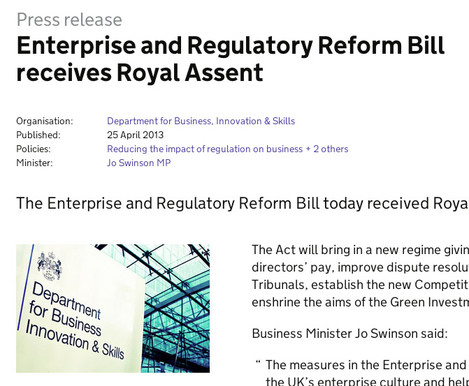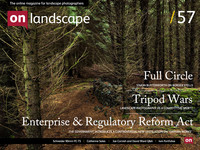Mitigating a Disaster

Tim Parkin
Amateur Photographer who plays with big cameras and film when in between digital photographs.
 The government in its infinite wisdom have recently applied for and receive royal assent for the "Enterprise and Regulatory Reform Act" which amongst other things has a couple of items that have a significant impact for photographers. The first is related to large rights collecting organisations e.g. the copyright equivalent to the PRS society. These may have an impact but for this article we'll be skipping past them.
The government in its infinite wisdom have recently applied for and receive royal assent for the "Enterprise and Regulatory Reform Act" which amongst other things has a couple of items that have a significant impact for photographers. The first is related to large rights collecting organisations e.g. the copyright equivalent to the PRS society. These may have an impact but for this article we'll be skipping past them.
The second is to do with so called "Orphan Works", items currently protected under copyright even though the original copyright creator cannot be found in order to gain permission for use.
Now at the moment in most countries these works cannot be used for any purposes except under 'fair use'. The government wishes to allow people to use such works as long as they :-
1) Make a reasonable effort searching for the owner (confirmed by an independent body)
2) Put a payment to one side for an appropriate amount should the owner appear
Photographers online have been losing their minds about this and there has been a lot of information and misinformation spread around to wind things up to a fever pitch.
Hopefully we can allay people's worst fears and direct their attention to where it will be of most use.
The first thing to put people at ease is that the law hasn't actually been passed yet, it might not get into law until late this year or early next year.
Additionally, the UK isn't first country in the world to implement such a law; Canada is the primary example who have been running a similar scheme since 1990. The world hasn't ended in the intervening period so we can only presume that the existence of such a scheme isn't necessarily the problem. (as an aside from our David Baker - this scheme has only granted 266 applications since it began!)
The need for an orphan works act of some sort is generally accepted by most parties but the scope of the act is at issue. If it were limited to non-commercial use and for museums etc it wouldn't be controversial but as soon as you wish to publish a book containing a work it becomes commercial. Hence a lot of very useful historical and editorial photographs cannot be used to document history (for instance) because of copyright. This is the part of the problem that the act is intended to circumvent.
So we are really talking about the details of the act rather than the whole existence of it.
The problem, as far as photographers are concerned, is that there work is going to get used illegally without payment. Let's take a look at a couple of scenarios
1) Images are taken from photographers website, credit stripped and submitted to agency as Orphan works.
The agency would need to see proof of diligent searches. We don't know how this would work at the moment but an estimate of 3.5 hours searching at a cost of £50 has been estimated. Given that most reverse searches I have seen would find most photographers websites this would not work.
Obviously this depends on the details of the agency in control of orphan work recognition.
2) Someone takes a photo from an anonymous upload website that has no metadata, is cropped differently, etc. and submits it as an orphan work.
This is the most dangerous situation. It would make a lot of sense to include legislation covering the removal of meta data from images. This has been discussed and suggested already.
Unfortunately, as one of our readers has pointed out, many of our social networks, image sharing websites and cloud storage services already strip metadata out. To check, take a look at this website "Embedded Metadata - Social Media Test Results" (thanks to John Dunne from the comments below)
3) A photographer licenses his work and hence loses control of watermarking, copyrighting information etc. Instant "Orphanification"!
It has been suggested in an amendment note to the bill that digital photographs will be excluded from the Orphan work act and that it should only apply to real photographs. That would be a nice idea :-)
The end results is that the 'devil is in the details'. Now is the time to put pressure on the government to ensure that these details are implemented fairly. For instance :-
- Orphan works 'users' could be limited to museums etc.
- Orphan works themselves may be limited to "works of art or of important social or historical relevance"
- The point of origin of the orphan work should be supplied and the publisher be traceable (i.e. no orphan works sourced from anonymous websites).
There are many ways that the act could do a lot of good whilst avoiding the issues that are currently inflaming the community.
There is a lot of work to be done to the scheme at the moment and I would encourage people to work out how the process can be lobbied - It is highly unlikely that the scheme will be withdrawn so efforts should be applied to restrict it's application.
I hope we have some readers who can enlighten us about this. I'm doing my own research and will report back when I find out more.
The first thing you should do is sign this petition and possibly contact your MP to ask about their position on the matter.
https://submissions.epetitions.direct.gov.uk/petitions/49422
Here are some more articles for your own research
The published bill via the Department of Business Innovation and Skills
The index page of the archive of all documents relating to the bill
Discussion about the bill in the House of Lords (search for "Orphan")
A paper analysing the Canadian scheme written in 2010
UPDATE: We asked David Noton one of Britain's most prolific and successful stock landscape photographer for his point of view.
"The more I ponder the implications of this ill-considered bill the more I realise just how it could affect all photographers, professional and amateur. In a nutshell no image that isn’t plastered to oblivion with disfiguring watermarks will be vulnerable to becoming orphaned and used for other’s commercial gain. The theft of images will shift from the shady preserve of a discreditable few to a legitimised business opportunity for many. Beyond the concerns of photographers facing a significant threat to their livelihoods photo agencies themselves will be affected, and the general public will see their own holiday and family snaps being ransacked. Whichever way you look at this Bill it’s a pig’s ear that legitimises copyright theft." - David Noton
At the moment the legislation looks like it could either be a great boon for museums or a single toll in the death knell of the creative industries of Great Britain. Our lobbying can only make things better so please get involved.

